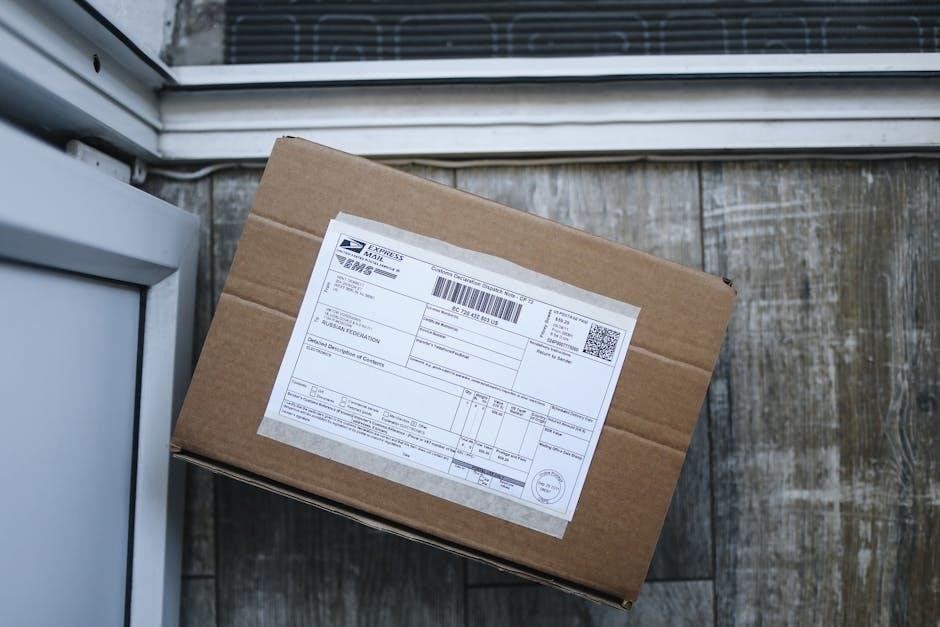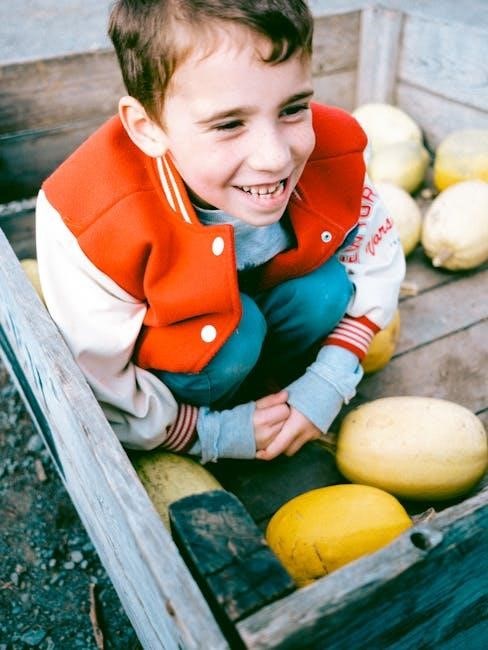the boy on the wooden box pdf
Leon Leyson’s memoir, The Boy on the Wooden Box, offers a poignant account of survival during the Holocaust․ As one of the youngest on Schindler’s List, Leyson recounts his harrowing journey from the Krakow ghetto to liberation, highlighting resilience and hope amidst unimaginable horrors․ Available as a PDF, this memoir provides a unique perspective on one of history’s darkest periods, ensuring Leyson’s story reaches a wide audience․
Overview of the Memoir
The Boy on the Wooden Box is a heart-wrenching memoir by Leon Leyson, detailing his experiences as a young Jewish boy during the Holocaust․ At just ten years old, Leyson faced unimaginable horrors, from the Krakow ghetto to concentration camps, before being saved by Oskar Schindler․ This poignant narrative captures the innocence of childhood lost, the resilience of the human spirit, and the enduring power of hope․ Available as a PDF, the memoir offers a deeply personal and accessible account of one of history’s darkest periods․

Leon Leyson’s Early Life and Background
Leon Leyson, born Leib Lezjon, was a young Jewish boy living in Poland when the Nazis invaded in 1939․ His early life was marked by the warmth of a close-knit family and the innocence of childhood․ However, the invasion shattered his world, forcing his family to relocate to the Krakow ghetto․ Leyson’s experiences during these formative years set the stage for his harrowing journey through the Holocaust, as detailed in The Boy on the Wooden Box PDF․
The Holocaust and Oskar Schindler’s List
The Holocaust, a devastating period of Nazi persecution, reshaped Leon Leyson’s life․ Oskar Schindler’s list became his lifeline, offering survival amidst unimaginable horrors, as detailed in the PDF of his memoir․

The Invasion of Poland and the Krakow Ghetto
In 1939, Nazi Germany invaded Poland, thrusting Leon Leyson and his family into a nightmare․ At just ten years old, Leon was forced to relocate to the Krakow Ghetto, where overcrowding, starvation, and constant fear defined daily life․ The memoir, available as a PDF, vividly captures the family’s struggle to survive amidst escalating persecution, setting the stage for their eventual encounter with Oskar Schindler and the improbable hope he offered․
Leon Leyson’s Role in Schindler’s Factory
Leon Leyson, just a young boy, played a critical role in Oskar Schindler’s factory, where he worked tirelessly alongside other Jews to produce war materials․ Despite his small stature, Leyson’s resourcefulness and determination earned him a place on Schindler’s list, ensuring his survival․ The memoir, available as a PDF, highlights how Schindler’s factory became a refuge, offering a glimmer of hope amidst the horrors of the Holocaust․ Leyson’s story underscores the human spirit’s resilience and the impact of Schindler’s bravery․
Survival and Perseverance
The Boy on the Wooden Box vividly portrays Leon Leyson’s relentless struggle to survive the Holocaust․ His journey through concentration camps and daily hardships underscores the power of hope and resilience, as detailed in the memoir, now accessible as a PDF․
Life in Concentration Camps and Daily Struggles
Leon Leyson vividly describes the harsh realities of life in concentration camps, particularly in Plaszow, where he faced relentless labor, starvation, and brutality․ The memoir, available as a PDF, details his daily struggles, including the constant fear of death and the dehumanizing conditions imposed by Nazi officials like Amon Goeth․ Despite these horrors, Leyson’s resilience and determination to survive underscore the strength of the human spirit in the face of unimaginable adversity․
Family Bonds and Hope Amidst the Horrors
Leon Leyson’s memoir, available as a PDF, emphasizes the vital role of family bonds in sustaining hope during the Holocaust․ Despite the relentless horrors, Leyson’s relationships with his parents and siblings provided emotional strength and a reason to persevere․ The memoir poignantly illustrates how familial love and shared determination became a beacon of hope, helping them endure the unimaginable hardships and ultimately survive the atrocities of the concentration camps․

Liberation and Aftermath
The liberation marked the end of Leon Leyson’s Holocaust ordeal․ The aftermath brought emotional and physical challenges, but also hope for rebuilding his life․

The End of World War II and Its Impact
The liberation of concentration camps marked the end of Leon Leyson’s harrowing experience․ The conclusion of World War II brought relief but also revealed the magnitude of loss․ Leyson’s story, as shared in The Boy on the Wooden Box, underscores the war’s profound impact on individuals and communities․ The aftermath allowed survivors to rebuild lives, fostering hope and resilience․ Leyson’s memoir serves as a testament to the human spirit’s ability to endure and heal in the face of unimaginable tragedy․
Leon Leyson’s Life After the Holocaust

After the Holocaust, Leon Leyson immigrated to the United States, where he rebuilt his life․ He became an educator, sharing his story to educate future generations about the Holocaust․ Leyson’s resilience and determination inspired many, as he transformed his traumatic experiences into a mission of hope and understanding․ His memoir, The Boy on the Wooden Box, became a vital resource for Holocaust education, ensuring his legacy endures․

The Legacy of “The Boy on the Wooden Box”
Leon Leyson’s Advocacy for Holocaust Education
Leon Leyson dedicated his life to Holocaust education, sharing his story to combat ignorance and promote tolerance․ Through his memoir and public speaking, he ensured future generations understood the atrocities of the Holocaust, fostering empathy and awareness․ Leyson’s advocacy continues to inspire educators and readers worldwide, preserving the lessons of history for a more compassionate future․

Reception and Reviews of the Memoir
The Boy on the Wooden Box has received widespread acclaim for its raw honesty and emotional depth․ Readers and critics praise Leon Leyson’s vivid portrayal of hope and resilience during the Holocaust․ The memoir is often compared to works like The Boy in the Striped Pajamas for its ability to convey the innocence and courage of a child in unimaginable circumstances․ Available as a PDF, its accessibility has further amplified its impact, making it a vital resource for Holocaust education and historical reflection․
Leon Leyson dedicated his life to sharing his Holocaust experiences to educate future generations․ Through his memoir and public speaking, he emphasized the importance of remembering the past to prevent similar atrocities․ His advocacy work has inspired educators and students worldwide, ensuring the lessons of the Holocaust remain relevant․ The availability of his story in PDF format has broadened its reach, making it a valuable tool for teaching tolerance and understanding․

Themes and Messages
Resilience, hope, and the human spirit are central themes in Leon Leyson’s memoir․ The story underscores the power of survival, perseverance, and the enduring strength of the human heart, even amidst unimaginable adversity, while the PDF format ensures its accessibility for global Holocaust education and remembrance․
Bravery, Resilience, and the Human Spirit
Leon Leyson’s memoir, The Boy on the Wooden Box, vividly portrays his courage and resilience as a young boy enduring the Holocaust․ At just ten years old, Leyson faced unimaginable horrors, yet his determination to survive and adapt shines through․ Working in Oskar Schindler’s factory, Leyson’s bravery in the face of constant danger exemplifies the strength of the human spirit․ His story, available as a PDF, highlights how hope and resilience can overcome even the darkest adversity, inspiring readers to reflect on the power of perseverance and humanity’s capacity for survival․
The Importance of Hope in Survival
In The Boy on the Wooden Box, Leon Leyson’s story underscores the vital role of hope in survival․ Amidst the Holocaust’s horrors, hope served as Leyson’s lifeline, sustaining him through the Krakow ghetto, concentration camps, and the constant threat of death․ Even in the darkest moments, hope fueled his resilience, helping him cling to the belief in a better future․ This theme resonates deeply, reminding readers of hope’s transformative power in overcoming adversity, as vividly captured in the PDF version of his memoir․
Historical Significance
The Boy on the Wooden Box holds profound historical significance as a rare memoir by a child survivor of the Holocaust․ Its PDF availability ensures Leyson’s story, detailing life under Nazi oppression and Oskar Schindler’s intervention, reaches global audiences, preserving a vital piece of history for future generations․
The Holocaust in Historical Context
The Boy on the Wooden Box situates Leon Leyson’s experiences within the broader Holocaust narrative, detailing Nazi Germany’s systematic persecution of Jews․ The memoir, available as a PDF, chronicles Leyson’s journey from Poland’s invasion to the Krakow ghetto and concentration camps, offering a personal lens through which readers can understand the scale and brutality of the Holocaust․ Leyson’s story aligns with historical records, providing a powerful, firsthand account of survival and resilience․
Oskar Schindler’s Role in Saving Lives
Oskar Schindler, a German industrialist, played a pivotal role in saving over 1,200 Jews during the Holocaust by employing them in his factories․ In The Boy on the Wooden Box, Leon Leyson recounts how Schindler’s list provided a refuge from certain death․ Schindler’s courage and manipulation of Nazi officials created a haven, showcasing humanity amidst atrocities․ Leyson’s memoir, available as a PDF, underscores Schindler’s heroism and its profound impact on his survival and the lives of many others․

The PDF Version and Its Accessibility
The Boy on the Wooden Box is widely available as a PDF, offering easy access to Leon Leyson’s story․ Its digital format ensures global reach, preserving Holocaust history for future generations in a convenient and accessible way․
Downloading and Reading the Memoir
The Boy on the Wooden Box PDF is readily available for download, offering readers a convenient way to access Leon Leyson’s powerful story․ The memoir, sized at 25 MB, can be downloaded for free by creating a simple account on platforms like Issuu or other eBook repositories․ This digital format ensures that Leyson’s emotional journey, detailing his survival on Schindler’s List, is accessible to a global audience, preserving his legacy for future generations․
The Impact of Digital Distribution on Holocaust Stories
Digital distribution has revolutionized access to Holocaust narratives like The Boy on the Wooden Box․ The PDF version ensures Leon Leyson’s story reaches a global audience instantly, fostering education and remembrance․ This format bridges generations, allowing younger readers to engage with historical accounts effortlessly․ By preserving such testimonies digitally, we honor survivors’ legacies and ensure their stories endure, combating forgetfulness and promoting tolerance in the modern world․
Leave a Reply